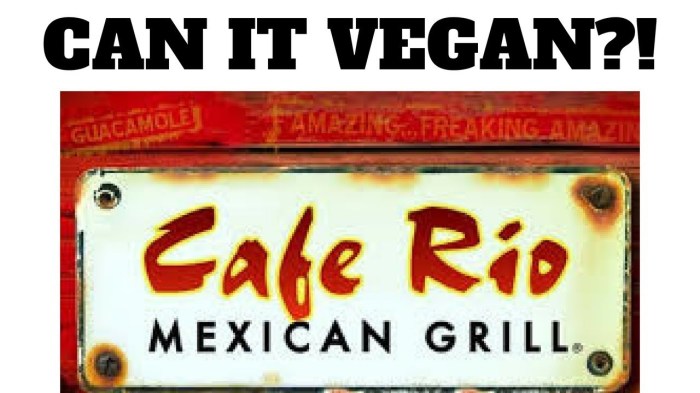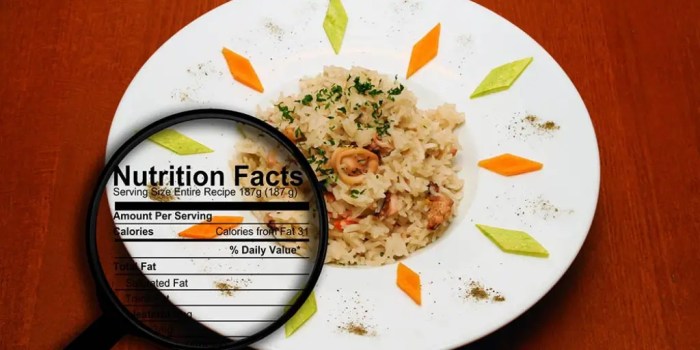Dietary Considerations

Cafe rio nutrition facts – Cafe Rio’s menu offers a variety of options, but navigating dietary restrictions can be challenging. Understanding the nutritional content and ingredients is crucial for making informed choices that align with individual health needs and preferences. This section details menu items suitable for various dietary restrictions, highlighting both nutritional benefits and potential drawbacks.
Vegetarian Options at Cafe Rio, Cafe rio nutrition facts
Cafe Rio’s vegetarian options primarily center around their bowls and salads. Many can be adapted to exclude meat, but careful attention to ingredients is necessary. For example, while the base of many dishes is vegetarian-friendly, some sauces and toppings may contain hidden animal products like cheese or honey. Always double-check ingredients with staff.
- Suitable Choices: Many of the rice and bean combinations, as well as the salads without meat additions, form a solid vegetarian base. Consider adding extra vegetables for increased nutritional value.
- Considerations: Some dressings and sauces may contain dairy or other animal products. Requesting a dressing on the side or opting for a simple vinaigrette can help maintain a vegetarian diet.
Vegan Options at Cafe Rio
Finding fully vegan options at Cafe Rio requires careful selection and communication with staff. While the restaurant doesn’t explicitly label vegan items, several components can be adapted to create a vegan meal.
Cafe Rio’s nutritional transparency, or lack thereof, is a microcosm of the larger food industry’s obfuscation. While their menu boasts flavorful dishes, a deeper dive into the specifics requires comparing their offerings to healthier alternatives, such as understanding the nutrition facts for white meat often featured in their proteins. Ultimately, Cafe Rio’s nutritional information leaves much to be desired, highlighting the need for greater regulatory oversight in restaurant food labeling.
- Suitable Choices: The base ingredients of rice, beans, and many vegetables are vegan. Be sure to avoid any cheese, sour cream, or other dairy-containing items.
- Considerations: Many sauces contain dairy or honey. Clearly communicate your dietary needs to ensure your meal is free from animal products. Confirm the vegan status of any chosen dressing or sauce.
Gluten-Free Options at Cafe Rio
Cafe Rio’s menu contains gluten in many items, particularly in sauces and breading. However, individuals with gluten intolerance can still find suitable options with careful planning.
- Suitable Choices: Many of the proteins and vegetables are naturally gluten-free. Rice and beans are also safe choices. However, carefully check the ingredients of any sauces or dressings.
- Considerations: Cross-contamination is a significant risk in a restaurant environment. Communicate your dietary needs to the staff and ask about their gluten-free preparation practices.
Low-Carb Options at Cafe Rio
For those following a low-carb diet, Cafe Rio offers some options, but portion control is crucial. Focusing on protein and non-starchy vegetables is key.
- Suitable Choices: Grilled meats and vegetables are good choices. Limit rice and beans, which are high in carbohydrates. Consider salads with a vinaigrette dressing.
- Considerations: Many sauces and dressings contain added sugars or carbohydrates. Choose your sauces carefully and opt for simpler options like lime juice or a small amount of salsa.
Ingredient Sourcing and Preparation

Cafe Rio’s commitment to fresh, high-quality ingredients is a cornerstone of its brand identity. This commitment extends beyond simple ingredient selection to encompass sustainable sourcing practices and meticulous preparation methods that enhance both the flavor and nutritional value of their dishes. Understanding these processes provides valuable insight into the restaurant’s dedication to providing a superior dining experience.Cafe Rio prioritizes partnerships with local and regional farmers and suppliers whenever possible.
This approach reduces the environmental impact associated with long-distance transportation, supporting local economies while ensuring the freshness and quality of their produce. The restaurant emphasizes the use of sustainably grown produce, prioritizing suppliers who adhere to environmentally responsible farming practices, minimizing the use of pesticides and promoting biodiversity. For ingredients not sourced locally, Cafe Rio works with suppliers who share their commitment to quality and ethical sourcing.
This commitment extends to their meat and dairy suppliers, ensuring animals are raised humanely and according to responsible standards.
Sourcing Practices and Sustainability
The restaurant’s dedication to sustainability is evident in its sourcing practices. For example, their commitment to using locally sourced produce significantly reduces carbon emissions from transportation. Furthermore, by partnering with farmers who employ sustainable agricultural methods, Cafe Rio contributes to the preservation of natural resources and the reduction of the restaurant’s overall environmental footprint. This proactive approach to sustainability resonates with environmentally conscious consumers and aligns with growing industry trends toward responsible sourcing.
The transparency regarding their supply chain allows consumers to make informed choices and support businesses that align with their values.
Preparation Methods for Key Menu Items
Cafe Rio’s preparation methods are integral to the unique flavors of their dishes. Their signature sweet pork, for instance, is slow-cooked for hours to achieve its tender texture and rich flavor profile. This low-and-slow cooking method allows the meat to absorb the spices and seasonings thoroughly, resulting in a succulent and flavorful dish. Similarly, their fresh salsas are made daily using hand-chopped ingredients to ensure maximum freshness and vibrancy of flavor.
The emphasis on fresh, hand-prepared ingredients distinguishes Cafe Rio from competitors who may rely on pre-packaged or processed components. This commitment to handcrafted preparation enhances both the taste and quality of their food.
Ingredient Journey: Farm to Plate
The journey of a single ingredient, such as a tomato, from farm to plate at Cafe Rio, exemplifies their dedication to quality. First, the tomato is carefully cultivated by a local farmer employing sustainable farming practices. Once harvested at its peak ripeness, it’s transported to a Cafe Rio location, minimizing travel time to maintain freshness. Upon arrival, the tomato is inspected for quality and then washed thoroughly.
Finally, it’s expertly chopped and incorporated into one of Cafe Rio’s fresh salsas, ready to be enjoyed as part of a delicious meal. This journey underscores the importance of each step in ensuring a high-quality product that meets Cafe Rio’s exacting standards.
Question Bank: Cafe Rio Nutrition Facts
Does Cafe Rio offer vegan options?
Yes, Cafe Rio offers several menu items that can be adapted to be vegan, such as salads and bowls. Check with your server to ensure your chosen customizations remain vegan.
Are Cafe Rio’s ingredients locally sourced?
Cafe Rio emphasizes fresh ingredients, but the specifics of their sourcing practices vary by location. Contact your local Cafe Rio for details on their sourcing.
How many calories are in a typical Cafe Rio bowl?
Calorie counts for Cafe Rio bowls vary greatly depending on the ingredients and portion size. Check the nutritional information available online or at the restaurant for specific calorie counts.
Can I get gluten-free options at Cafe Rio?
Yes, several Cafe Rio menu items can be modified to be gluten-free. Be sure to inform your server of your dietary needs to ensure your meal is prepared accordingly.
